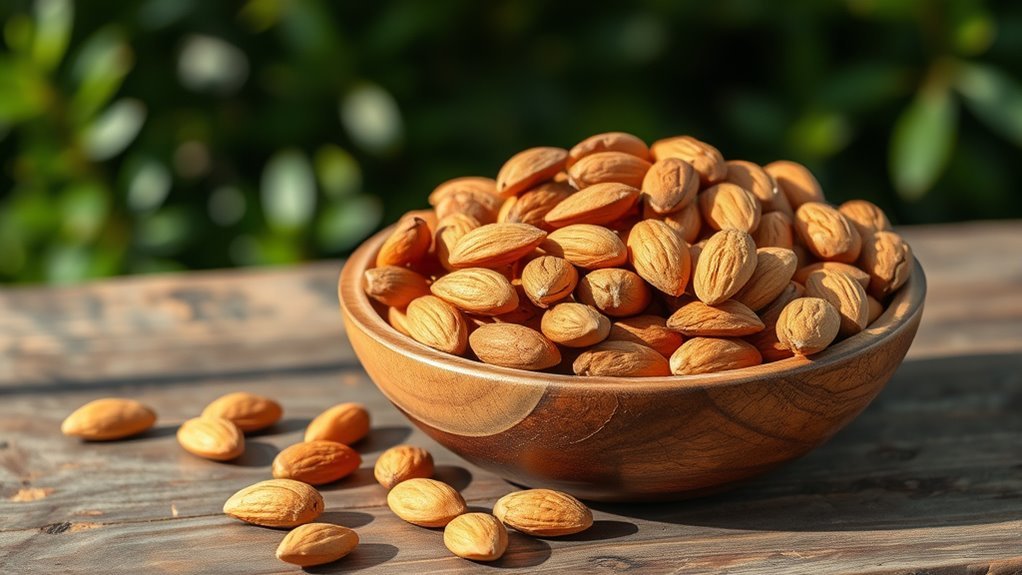Yes, almonds are keto-friendly! They’re low in net carbs, with just 2.5 grams per ounce, and are packed with healthy fats, protein, and fiber. Their nutrient density makes them ideal for satisfying snack cravings while keeping you on track with your ketogenic diet. Plus, almonds offer numerous health benefits, supporting heart health and aiding digestion. There’s so much more to discover about incorporating almonds into your meal plan.
Nutritional Profile of Almonds

When it comes to the nutritional profile of almonds, you’ll find they’re packed with essential nutrients that make them a popular choice for those on a keto diet. Rich in healthy fats, protein, and fiber, almonds offer a great nutrient density that supports your overall health. Different almond varieties, like raw, roasted, and flavored, maintain similar nutritional benefits, though roasting can alter some properties. You’ll benefit from vitamin E, magnesium, and antioxidants that promote heart health and reduce inflammation. The high monounsaturated fat content also aids in satiety, keeping you feeling full longer. Incorporating almonds into your meals can enhance taste while providing crucial nutrients, allowing you to enjoy the freedom of delicious, healthful eating without compromising your keto goals.
Carb Content and Serving Size

When considering almonds on a keto diet, it’s important to look at their carb content and recommended serving size. A typical serving of almonds, around one ounce or about 23 nuts, contains roughly 6 grams of carbs, making them a suitable snack for maintaining ketosis. Understanding these factors can help you incorporate almonds effectively into your low-carb lifestyle.
Almonds’ Carb Count
Although almonds are often celebrated for their numerous health benefits, understanding their carb count is essential, especially for those following a keto diet. Different almond varieties can have varying carb counts, but on average, one ounce (about 28 grams) of raw almonds contains roughly 6 grams of total carbohydrates, with about 3.5 grams of fiber, making net carbs around 2.5 grams.
Here’s a breakdown of almond varieties and their carb sources:
| Almond Variety | Total Carbs (g) | Net Carbs (g) |
|---|---|---|
| Raw Almonds | 6 | 2.5 |
| Blanched Almonds | 6.1 | 2.6 |
| Roasted Almonds | 6.2 | 2.7 |
| Almond Flour | 22 | 10 |
This information can help you make informed choices.
Recommended Serving Size
A typical serving size of almonds is about one ounce, or approximately 28 grams, which offers a reasonable balance of nutrients while keeping carb intake low. In this serving, you’ll find around 6 grams of carbohydrates, making it a great choice for those following a keto diet. Practicing portion control is essential, as it’s easy to overindulge. Stick to this serving size to enjoy the health benefits without jeopardizing your carb limits. Plus, almonds provide healthy fats, protein, and fiber, enhancing satiety and supporting your wellness goals. So, when you’re snacking, remember that moderation is key. By keeping your serving size in check, you can savor almonds while staying aligned with your keto lifestyle and enjoying the freedom of mindful eating.
Health Benefits of Almonds

Almonds are a powerhouse of nutrition, providing a wealth of health benefits that align perfectly with a keto lifestyle. Rich in healthy fats, they support heart health by improving cholesterol levels and reducing inflammation. Their high fiber content promotes digestive health and helps keep you feeling full longer, which can be beneficial for weight management. Almonds also boast impressive antioxidant properties, shielding your cells from oxidative stress and potentially lowering the risk of chronic diseases. Incorporating almonds into your diet can enhance overall well-being while satisfying your snack cravings. By enjoying a handful of almonds, you’re not just indulging; you’re making a smart choice for your health that aligns beautifully with your keto journey.
Almonds in a Keto Meal Plan
Incorporating almonds into your keto meal plan can be a game-changer for both taste and nutrition. These nuts are not only low in carbs but also packed with healthy fats that support your keto lifestyle. You can whip up various almond recipes, from almond flour pancakes to keto-friendly granola, adding versatility to your meals. As a quick and satisfying option, almonds make excellent keto snacks, providing a crunchy texture and rich flavor without compromising your carb count. Plus, they’re a great source of protein and fiber, helping you feel full longer. By including almonds, you can enjoy delicious options while staying on track with your keto goals, giving you the freedom to explore new culinary delights.
Common Misconceptions About Almonds
You might be surprised to learn that almonds are often misunderstood when it comes to their nutritional value. Many people confuse the total carbohydrate content with the fiber they provide, leading to misconceptions about their suitability for a keto diet. Understanding these nuances can help you make more informed choices about including almonds in your meals.
Nutritional Value Confusion
While many people recognize almonds as a nutritious snack, misconceptions about their nutritional value often lead to confusion, particularly among those following a keto diet. One common myth is that almonds are too calorie-dense to fit into a low-carb lifestyle. In reality, almonds provide healthy fats and protein that can aid in nutrient absorption, making them a smart choice for keto enthusiasts. Their calorie density means you get a lot of energy in a small serving, which can be beneficial when you’re looking to maintain your energy levels without consuming excessive carbs. By understanding their nutritional profile, you can make informed decisions about including almonds in your diet, enjoying their benefits while staying true to your dietary goals.
Carbs vs. Fiber Misunderstanding
Although many people associate carbohydrates solely with weight gain, understanding the distinction between carbs and fiber is vital for those on a keto diet, especially regarding almonds. Almonds are not just about carb counting; their fiber content plays a significant role in fiber digestion. Here are key points to reflect on:
- Total Carbs: Almonds contain carbs, but most of them come from fiber.
- Net Carbs: When counting carbs, subtract fiber from total carbs to find net carbs.
- Satiety: High fiber content can help you feel full, reducing overall calorie intake.
- Blood Sugar Impact: Fiber may slow sugar absorption, preventing spikes.
Alternatives to Almonds on Keto
If you’re looking for alternatives to almonds on a keto diet, you’ll find several options that can satisfy your cravings while keeping your carb intake low. Walnuts are a great alternative, offering healthy fats and a similar crunchy texture. They’re also rich in omega-3 fatty acids, making them a heart-healthy choice. Pecan substitutes work well too, providing a sweet, buttery flavor that can elevate your dishes. Both walnuts and pecans are low in carbs, making them suitable for keto. You can use them in baking, snacking, or as toppings for salads. So, don’t hesitate to mix it up and explore these alternatives—your taste buds and your keto lifestyle will thank you!
Frequently Asked Questions about Almonds and the Keto Diet
1. Are almonds low in carbs?
Yes, almonds are relatively low in carbohydrates. A one-ounce (28 grams) serving of almonds contains about 6 grams of total carbohydrates, of which 3.5 grams are fiber. This means that the net carbs are approximately 2.5 grams, making almonds a popular choice for those following a keto diet.
2. How do almonds fit into a keto diet?
Almonds can fit well into a keto diet due to their high healthy fat content and low carbohydrate levels. They are an excellent source of monounsaturated fats, which can help you feel fuller longer. You can enjoy almonds as a snack, add them to salads, or use almond flour for keto-friendly baking.
3. What is the recommended serving size of almonds on a keto diet?
The recommended serving size of almonds on a keto diet is typically around one ounce, which is approximately 23 almonds. This portion provides a good balance of healthy fats, protein, and fiber while keeping net carbs low, making it an ideal snack for keto followers.
4. Can I eat almond butter on a keto diet?
Yes, almond butter is also keto-friendly as long as it is unsweetened and contains no added sugars or unhealthy oils. Almond butter retains the health benefits of whole almonds and can be used as a spread or ingredient in various keto recipes, providing a creamy texture and rich flavor.
5. Are there any downsides to eating almonds on a keto diet?
While almonds are nutritious, moderation is key. Due to their high-calorie content, overeating almonds can lead to excessive calorie intake, which may hinder weight loss goals on a keto diet. Additionally, some individuals might experience digestive issues if consuming large amounts of nuts. It’s best to incorporate almonds mindfully within your overall dietary plan.
References
- https://www.ncbi.nlm.nih.gov/pmc/articles/PMC6343622/
- https://www.healthline.com/nutrition/are-almonds-keto
- https://www.medicalnewstoday.com/articles/323072
- https://www.mayoclinic.org/healthy-lifestyle/nutrition-and-healthy-eating/expert-answers/almonds-and-keto-diet/faq-20452819
- https://www.hsph.harvard.edu/nutritionsource/food-features/almonds/


